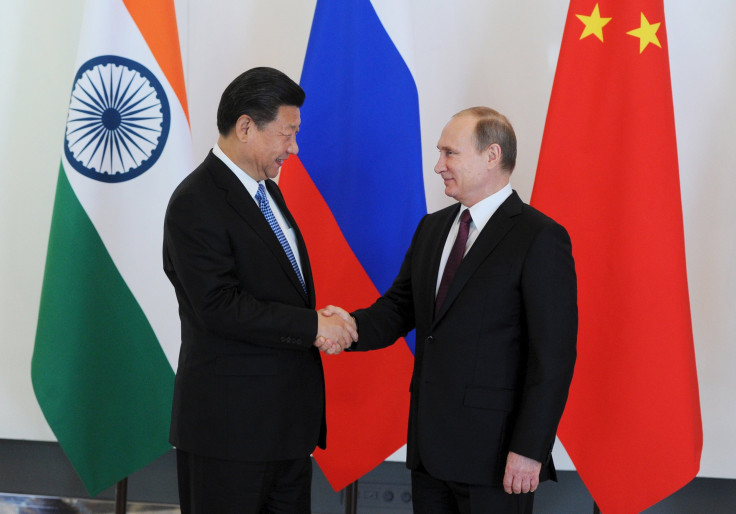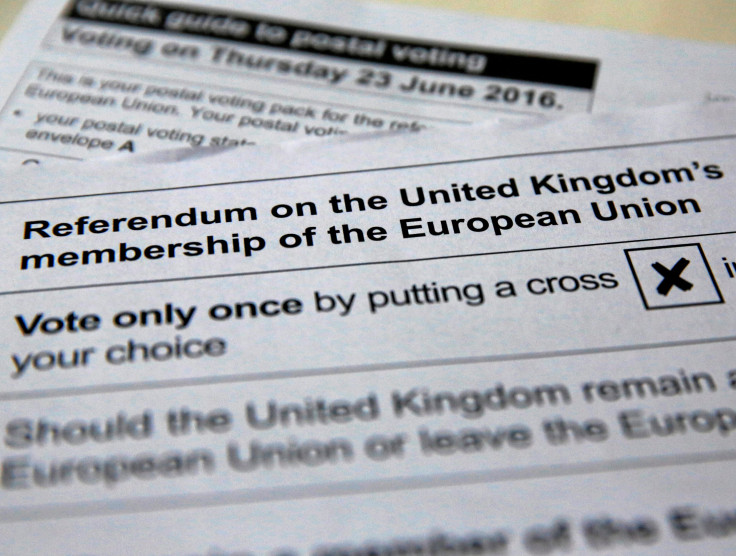Russia, China And Brexit: What Putin And Xi Have To Lose And Gain From Britain Leaving The EU

Moscow and Beijing have a lot in common: a 2,500-mile border, a $400 billion gas deal, strongman leaders with a ken for opposing the U.S-dominant West — and a mutual love of Russian President Vladimir Putin.
Heads of both states are motivated by keeping the U.S. sphere of influence — whether in Ukraine or the South China Sea – in check, but they’re on opposite sides of the European Union referendum or “Brexit” debate.
China’s political elites, according to leading Chinese newspaper Global Times, are “anxious over the political consequences” of a 'Yes' vote Thursday, and have publicly expressed their hope that Britons will choose to remain in the EU.
Putin, meanwhile, has not explicitly come out in favor of the U.K.’s departure, despite British Prime Minister David Cameron’s claims to the contrary, but an analysis of Kremlin-controlled media suggest their editorial line was strongly tilted in support of Brexit.
International Business Times takes a closer look at what these geopolitical behemoths have to gain — and lose — from Britain saying “Hasta la vista” to Europa.
WIN:
- Crisis in the EU is a blessing for Moscow: Without the U.K. — one of the most vocal supporters of the EU’s sanctions regime against Russia — Russian officials say pressure on the Kremlin will be reduced, leading to significant foreign policy benefits.
- A weaker Europe is a weaker NATO: The disintegration of the EU could translate into a weakening of the North Atlantic Treaty Organization, long regarded by Russia as a political and military threat.
- More opportunities for bilateral trade: Both China and Russia could benefit from stronger economic ties with London, as an isolated U.K. pushes for increased cooperation in a range of fields, including the financial sector.
- Less financial regulation: If Britain votes to leave, restrictions imposed on the country’s financial sector by the EU might be loosened, prompting a boost in financing for Chinese and Russian investment projects.

LOSE:
- The EU — and Britain — will lose their global status: What is a boon for one is the bane of another. Russia might reap the political rewards of an attenuated Europe but China fears this skewing of influence will have deleterious effects.
- A divided EU would be less of a counterbalance to the power of the United States: China’s elites don’t want the American axis of power to be the only one. “A multipolar world requires more powers, which are independent of the U.S., to participate in international governance,” the Global Times wrote.
- Challenging investment market: China’s richest man, Wanda group head Wang Jianlin, who has invested in British property, said earlier this year that a British departure from the EU “would create more obstacles for investors.”
- Currency depreciation: Asian economies could be hard-hit by depreciation of the pound, predicted by many economists if Britain votes to quit the EU. Investment in Asia could withdraw from the region toward havens, leading to enormous capital outflows.
- Slump on global financial markets: If London loses its status as the gateway into the European market, international companies, including both Russian and Chinese, will have to change their public offering priorities, potentially relocating their European operations elsewhere — at a hefty cost.
© Copyright IBTimes 2024. All rights reserved.






















